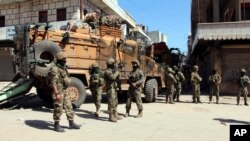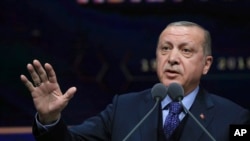With Turkish led military forces scoring a decisive victory in Syria against the YPG Kurdish militia, speculation is rife in Turkey of early general and presidential elections.
Sunday's capture of the key Syrian town of Afrin from the YPG was perfectly choreographed to coincide with Turkey's Martyrs Day. The symbolism was not lost on Turkish President Recep Tayyip Erdogan who has linked his fortunes to the military incursion, declaring the Syrian campaign the most important since Turkey's war of independence.
Ankara calls the YPG "terrorists", linking the militia to a decades long Kurdish insurgency inside Turkey. Erdogan's political message has been obediently followed by most the media, which is under direct or indirect government control.
"It (Syrian operation) has shored up his political position. There is already talk of bringing the elections forward," observes political columnist Semih Idiz of Al Monitor website, "I think that discussion will be more animated now, and Erdogan and his political advisors may try and strike while the iron is hot." General and presidential elections have to be called by 2019.
Critics have accused, usually anonymously, Erdogan of deliberately orchestrating the Syrian military campaign to create the grounds for an election victory. An accusation he strongly rejects.
Rules changing
But early election rumors are fueled by the passing of a series of electoral reforms earlier this month by Erdogan's ruling AKP party. The reforms include allowing of electoral alliances between political parties. It allows the formalization of an existing pact between the AKP and the nationalist MHP Party.
The electoral reforms also included controversial measures critics say removed voter fraud protections and opened the door to gerrymandering. Both charges the government rejected.
But Erdogan has repeatedly rejected speculation of early polls, insisting the election will be held as scheduled in November 2019. Throughout his 15 years in power, first as prime minister and then head of state, Erdogan has never called early polls.
"I don't think Erdogan wants early elections" claims political analyst Atilla Yesilada of Global Source Partners, "Erdogan is operating under two assumptions. Continuing to push the (Syrian) Kurdish militia away from border will continue to give him a boost in the polls, and he thinks by continuing to pump more fiscal stimulus into the economy, he can increase voter satisfaction,"
The Turkish economy is booming, thanks to billions of dollars of stimulus by the government through major infrastructure projects and cheap loans to companies.
Erdogan has pledged to expand military operations to remove the YPG Kurdish militia from all its border. But military and economic realities could yet force Erdogan's hand, "He will soon grasp his goals are simply not possible," warns analyst Yesilada. "The advance of the Turkish forces toward east in Syria are going to be prevented by the United States and economic turbulence and withdrawal of portfolio investments from Turkey will slow down the Turkish economy. Soon Mr. Erdogan will grasp this is as good as it gets, it does not get any better."
Economic alarm bells have already starting ringing about the sustainability of Turkish economic growth. Earlier this month the international financial rating agency, Moody's, reduced Turkey's rating, citing concerns about an over heating economy and future sustainability to repay its financial debts. Such concerns have resulted in the Turkish currency touching record lows. Experts warn of looming growing economic and financial problems.
Changing political landscape
But the dilemma facing Erdogan is that while the Syrian military operation appears broadly popular, opinion polls have provided only a mixed picture on whether that has transferred into electoral gains for him personally and his AKP Party.
"While AKP may be gaining (Turkish) nationalists voters they are losing in the Kurdish population," observes analyst Yesilada,"remembering up to 50 percent of Kurds voted for AKP previously, whereas probably one-third of nationalists vote AKP. The losses among Kurds is more significant than the gains to be made from the nationalist base."
Kurds roughly account for 20% of the Turkey's electorate. Another complicating factor in Erdogan's electoral calculations, is in the past Kurds who voted for his AKP Party did not have a strong electoral alternative, as many AKP Kurdish voters are deeply hostile to the pro Kurdish HDP. But a new center right IYI party is actively targeting Erdogan's Kurdish vote. With most opinion polls only predicting a narrow majority for an Erdogan presidency and some polls indicating his ruling AKP even losing it majority, observers suggest early polls remains a gamble.





